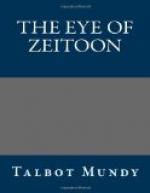We followed him through the doorless gap in the tower wall, and up broken stone stairs littered with fragments of the fallen roof, until we stood at last in a half-circle around the jagged rim, our feet wedged between rotten masonry, breasts against the saw-edge parapet, and heads on a level with the eagles. From that dizzy height we had a full view between the mountains, not only of the immediate environs of Zeitoon, but of most of the pass—up which we ourselves had come, and of some of the open land beyond it.
“D’you see Turks now?”
Monty pointed, but there was no need. Dense masses of men were bivouacked beyond the bottom of the wide clay ramp. Through the glasses I could see artillery and supply wagons. They were coming to make a thorough job of “rescuing” Zeitoon this time! After a while I was able to make out the dark irregular line of Kagig’s men, and here and there the lighter color of freshly dug entrenchments. None of Zeitoon’s defenders appeared to be thrown out beyond the clay ramp, but they evidently flanked it on the side of the pass that was farthest from us.
“Now look this way, and you’ll understand.”
Monty pointed to our right, and the significance of the voices we had heard so close to us when Fred was searching for a path around the clay on the morning of our arrival, was made plain instantly. Down from the ledge on which the castle stood to a point apparently within a few yards of the clay ramp there had been cut a winding swath through the forest, along which four horses abreast could be ridden, or as many men marched.
“How did you do all that in time?” demanded Will. “It looks like one of those contractor’s jobs in the States—put through while you wait and to hell with everything!”
“It follows the old road,” Monty answered. “There was too much cobble-paving for the trees to take hold, and most of what they had to cut was small stuff. That accounts, too, for the freedom from stumps. But, do you get the idea? The trees between the end of the cutting and the clay ramp are cut almost through—ready to fall, in fact. I’m afraid of a wind. If it blows, our screen may fall too soon! But if the Turks try to storm the ramp, we’ll draw them on. Then, hey—presto! Down go the remaining trees, and into the middle of ’em rides our cavalry!”
“What’s the use of cavalry four abreast?” demanded Fred, in no mood to be satisfied with anything.
“Rustum Khan is concentrating all his energy on teaching that one maneuver,” Monty answered. “We come—”
“Thought it ’ud be ‘we!’ Your place is at the rear, giving orders!”
“We come down the track at top speed, and the impetus will carry us clear across the ramp. Some of the horses’ll go down, because the slope is slippery. But the remainder will front form squadron, and charge down hill in line. Then watch!”
“All right,” Fred grumbled. “But how about you rear while all that’s going on? The Turk must have worked his way around Beirut Dagh on former occasions—or how else could he ever have built and held that dismantled fort? What’s to stop him from doing it again?”




